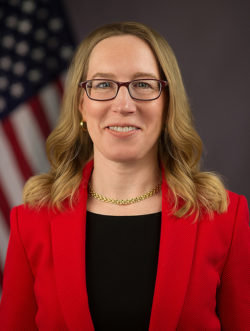SEC commissioner Hester M. Peirce this week reiterated her opposition to the SEC rule proposal that would require public companies to disclose data on their potential climate impact.
While she did not touch on the related proposal that would regulate how registered funds manage investment strategies based on environmental, social or governance (ESG) factors, her remarks at a Dec. 7 American Enterprise Institute webinar echoed past criticisms of the ESG proposal, which she has described as a “prescriptive ‘nag rule’” that duplicates current regulations but is “incapable of enforcement on a practical level.”

A rule requiring that public companies disclose the environmental impact of their activities sounds simple but, in practice, is likely to raise the cost of data gathering while delivering data that may be horribly inaccurate, misleading, or irrelevant to investors, Peirce said.
She also criticized the rule’s requirement that companies report climate-related risks “reasonably likely to have a material impact…over the short, medium and long term” as broad and non-specific. The SEC currently requires that companies report material risks but allows each to define what risks are material and omit those that are not.
“The climate proposal, by contrast, through numerous specific disclosure mandates, could elicit granular, immaterial information,” she said. “If the proposal were adopted, climate risk would occupy a lot of space in every company’s SEC filing…[which] could over-emphasize climate issues and obscure differences between companies.”
Many companies argue that climate-related data about their operations is not material, but, in most cases, they’re wrong, according to former SEC commissioner and current New York University law professor Robert J. Jackson who also spoke at the AEI webinar Dec. 7.
There is a wide array of academic research showing that when climate-related information about a company is released to the marketplace, “the cumulative abnormal returns of stocks tend to respond to the disclosure of that information,” said Jackson, who served as an SEC commissioner from January 2019 to February 2020. “The materiality standard is not based on the [opinion of the] reasonable SEC commissioner or the reasonable Washington Republican, it’s based on the reasonable investor and the trillions of dollars that are being raised and invested on the basis of information you claim is not material,
Materiality isn’t the only issue, however, according to Peirce, who worried that the rule’s requirement that companies name board members or other executives as being individually responsible for climate-risk data gathering and disclosure could also inflate the importance of climate risk to an unrealistic degree.
Requiring companies to provide risk analyses projecting risks months or years in the future, based on the decisions of other companies in a supply chain, is also inherently untrustworthy and are more likely to mislead investors than to guide them, she added.
“In other words, the SEC proposes to require companies to disclose whether and how a company is preparing for a risk that may or may not happen years in the future, the occurrence of which depends upon the actions of a multitude of other parties,” Peirce said. “These disclosures will be inherently speculative.”
Even leaving out the need to create probability models to estimate future risk, the logistics and technical challenge of gathering so high a volume of data is likely to inflate the cost of listing a company’s offerings from an annual total of about $2bn to between $6.4bn and $8.4bn, according to figures cited by SEC Commissioner Mark Uyeda during a Nov. 17 speech at the Cato Institute.
Peirce, the senior Republican member of the commission and most consistent opponent of climate- and ESG-related regulation, said the overly prescriptive, micromanaging approach of the climate-risk rule is typical of the flawed decision-making process that has become common in the SEC under the administration of Gary Gensler, whom she accused in June of tending to “shun issues at the core of our mission in favor of shiny objects outside our jurisdiction.”
“The SEC’s role is to serve as referee” in competitive U.S. financial markets, “not as coach or player,” she said. “Some of our current rulemaking endeavors seek to displace competitive forces with SEC mandates. If we do not listen to commenters as we proceed with those rulemakings, we might be getting lots of properly addressed complaint letters.”
Peirce and other critics of the climate risk disclosure proposal generally view it in the same terms as the ESG proposal for registered funds, both of which were announced earlier this year. The goal of the ESG rule is to reduce the chance that investors will be misled by fund or investment advisers who “greenwash” financial products by using ESG-related marketing language without real practices that back it up, according to SEC Chair Gary Gensler, who has characterized the rule as an effort to protect the growing market of ESG-focused investors.
